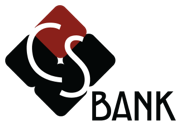Tips for Small Business – Combating Cyber Fraud
Cybercriminals are increasingly targeting small businesses to transfer funds from accounts and steal private information, a fraud referred to as “corporate account takeover”. Criminals use spoofed emails, malicious software and online social networks to obtain login credentials to business accounts in order to make illicit transactions. CS Bank provides Multi-Factor Authentication services through our eBusinessLink online banking provider; however, combating account takeover is a shared responsibility between businesses and financial institutions.
Here are a few tips to help prevent account takeover:
Protect your online environment.
It is important to protect your cyber environment just as you do your physical location. Do not use unprotected internet connections and keep updated anti-virus and anti-spyware protection on your computers. Change passwords at least every 90 days and use something complex with a combination of numbers, letters and special characters. Don’t use the same password for different software programs or internet sites.
Partner with Cornerstone Bank for payment authentication.
CS Bank will not release an online initiated wire transfer or ACH transaction without first verifying with an authorized employee at your business. In addition, talk to us about services that offer call backs, multi-person approval processes, batch limits and other tools that help protect you from unauthorized transactions.
Pay attention to suspicious activity and react quickly.
Put your employees on alert. Watch out for strange network activity, do not open suspicious emails and never share account information. If you suspect a problem, disconnect the compromised computer from your network and contact the Bank.
Understand your responsibilities and liabilities.
The online banking agreement with CS Bank details what commercially reasonable security measures are required in your business. It is critical that you understand and implement the security safeguards in the agreement. If you don’t, you could be liable for losses resulting from account takeover. Please contact CS Bank if you have any questions about your responsibilities.
